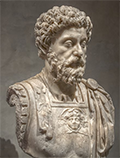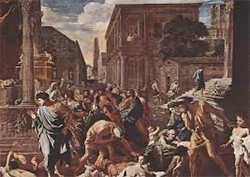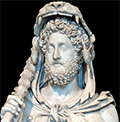The Rise and Fall of the Roman Empire
Part 5: Stoic and Megalomaniac One of the first domestic difficulties facing the new co-emperors was a flooding of the River Tiber that left much of the Eternal City underwater. The damage to many buildings was severe. Many animals drowned, and many people had little food. Lucius and Marcus saw to it that the hungry could eat. 
Marcus Aurelius (left) never stopped being a philosopher. In fact, he wrote his own work, Meditations (in Greek), while on campaign during the last decade of his life. The work remains popular in philosophy studies. He was also a skilled legal scholar and enjoyed passing judgements on disputes and petitions. Importantly, he maintained good relations with the Senate, unlike some of his predecessors. Lucius went east to fight against the Parthian king Vologases IV, who had brazenly replace the Roman governor of Armenia with someone more to his liking and then defeated Roman forces led by the Roman governors of two other provinces, Cappadocia and Syria. Lucius was ostensibly in charge of the army, but he didn't do much of the fighting. Rome prevailed, however, destroying the Armenia capital city of Artaxata and then, in 166, capturing the strongholds of Ctesiphon, in the process razing the royal palace. 
Lucius and the army headed back to Rome, unwittingly bringing with them a devastating disease. The so-called Antonine Plague originated in Mesopotamia and ripped through Asia Minor, Greece, and Italy, claiming what many historians estimate was 10 percent of the Empire's population. Later reports termed the plague smallpox, based on descriptions of the symptoms. Lucius himself might have fallen victim to the plague. He became seriously ill on his way from Aquileia to Rome and died, in 169. The most severe challenge to Roman dominance on the frontier came in Germany, in the 160s. A succession of tribes, among them the Lombards and Marcommani and Sarmatians, crossed the Danube or marched into Gaul, intent on finding new homes. After a long struggle, the Romans, with Marcus in the field, were successful at turning back the invasions. A tall victory column, completed in 193, commemorates his victory over the German tribes. Marcus Aurelius was in Vindobona (what is now Vienna) when he died, on March 17, 180. he was 58. His death was not suspicious; rather, he died after living a hard life. He had named his son Commodus Caesar in 166, and the two had ruled jointly from 177. Commodus took the throne after his father died. Commodus quickly moved to negotiate a peace agreement with the German tribes that Rome had been fighting. He returned to Rome on Oct. 22, 180, and celebrated a triumph. All of 18, he had little interest in the running of the government, leaving such mundane matters to his advisors. 
What he really enjoyed was the thrill of the games. He ordered many such spectacles and particularly enjoyed watching gladiatorial contests. He even took part in a few, always managing to win. He spent large sums of money on these public entertainments. That, coupled with his seeming weakness because he was willing to cede his responsibilities to others, made him a target for conspiracies. In 190, he reasserted his authority. He presented himself as a reincarnation of the famous hero Hercules. Wearing a cloak made from a lion's hide, he demanded that the Senate declare him a living god and refer to him not as Commodus but as Hercules. He followed that up with orders to construct statues of himself in various places around Rome. He renamed the months of the year and took advantage of a large-scale fire in 191 to remake Rome the way he wanted it to look. Then, he changed the name of the city to Colonia Commodiana ("Colony of Commodus"). In that same year, he ordered his wife executed. For the New Year's Day 193 festivities, Commodus announced his intention to fight again in the arena. He never made it. The night before, his new favorite woman, Marcia, tried to poison him. The seemingly indestructible Commodus didn't look to be dying from ingesting the poison, so Marcia went with the backup plan, which was to have Narcissus, a professional wrestler, choke Commodus to death. He had not named a successor and had no children; this led to a succession crisis, resulting in the Year of the Five Emperors. Next page > Imperial Crises > Page 1, 2, 3, 4, 5, 6, 7, 8, 9 |
|
Social Studies for Kids
copyright 2002–2026
David White




